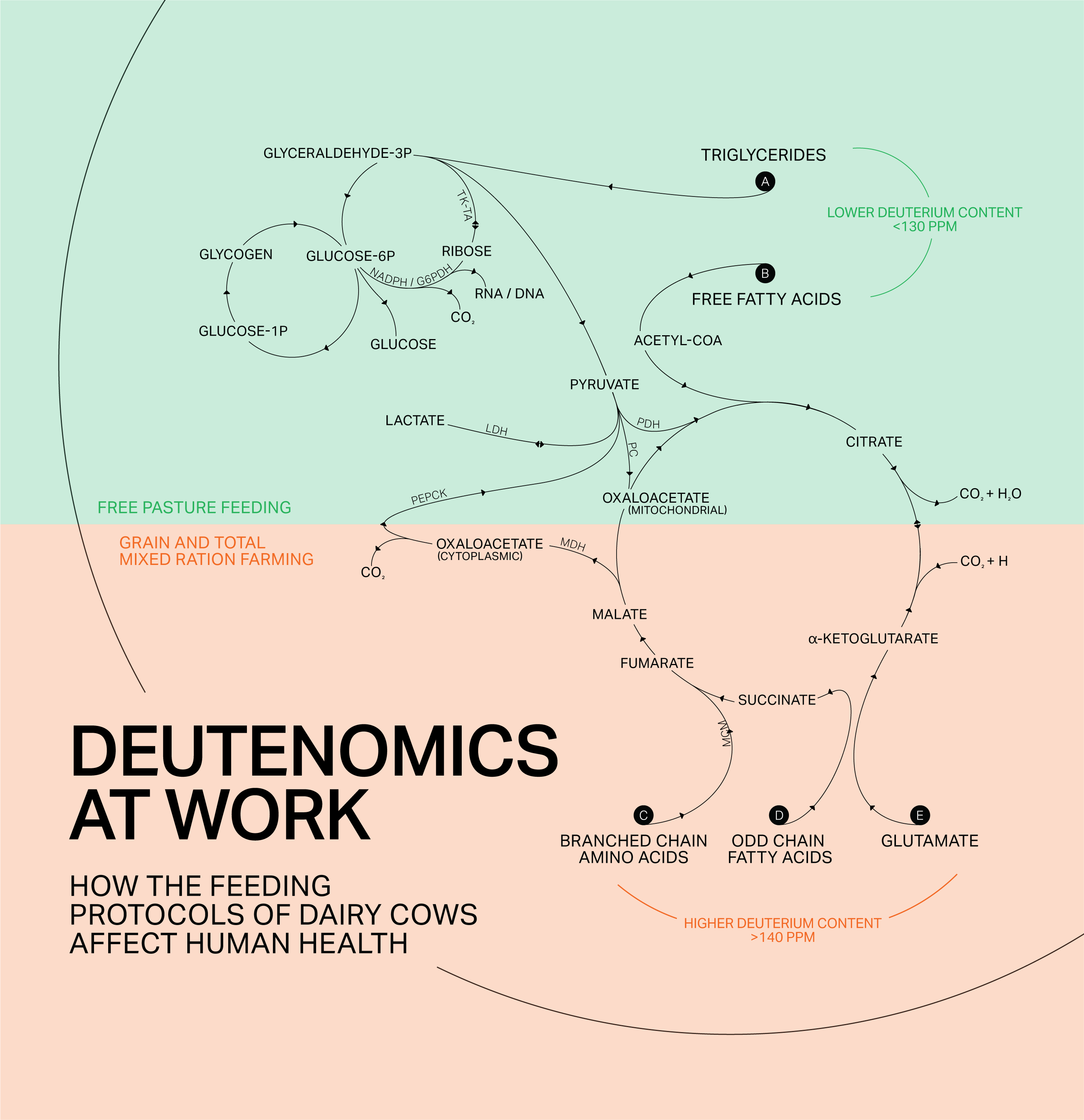EVIDENCE OF THE EFFICACY OF
DEUREGULATION AND DEUPLETION
To date, there have not been any studies published that combine both a natural, seasonal, local, ketogenic, deupleting diet while simultaneously consuming deuterium-depleted water and optimizing your light environment as well as other important lifestyle adjustments that deuregulate (regulate deuterium).
What we do have plenty of data on is both the efficacy of the ketogenic diet –– with its inherent deupleting potential as fats are low in deuterium –– as well as the efficacy and benefit of the application of deuterium-depleted water (DDW).
In 1999 Gábor Somlyai published Defeating Cancer! The Biological Effect of Deuterium Depletion, which was translated in English and published in 2001.
Since 2010, Gábor Somlyai and his team have organized four International Deuterium Depletion Symposia in Budapest, Hungary. These are scientific meetings where researchers present their latest findings. Please see the link for list of speakers and presentations.
Dr. Somlyai has since published many papers on the antitumor effect and efficacy of DDW for breast, lung, prostate, and pancreatic (2021)cancer as well as insulin resistance, metabolic syndrome, and specific cancer cell lines.
Other researchers have reported similar findings:
A Romanian study reported in 2010 that tests showed a strong protective effect of DDW against the decrease of immunologic parameters and a decrease in tumor mass or its total regression.
In 2019 researchers from the Karolinska Institutet, who presented the Anticancer effect of deuterium depleted water at the 4th International Deuterium Depletion Symposium, published a paper of the same title that concluded “DDW seems to have potential in antitumor therapy, especially in the modalities inducing oxidative stress in cancer cells”.
A review article published in 2019 entitled “Deuterium Depleted Water as an Adjuvant in Treatment of Cancer” concluded that the positive effects of using deuterium depleted water make it possible to consider it as both a prophylactic agent and a promising adjuvant antitumor agent.
In another 2019 a new paper showed the efficacy of DDW in conjunction with chemotherapy in breast cancer cell lines, concluding that “DDW can be considered as an adjuvant to conventional anticancer agents in future trials”.
In 2020 a Russian team published “Time-dependent effect of deuterium depletion on tumor growth and metastasis”. They report “Our findings demonstrate that deuterium depletion exerts antitumor effect by both inhibition of tumor growth and metastasis, but development of the effect is time-dependent.” This is important data as it confirms Dr. Somlyai’s findings he presented in 2019 at the 4th International Deuterium Depletion Symposium, that timing as well as continuation of treatment are both critical to increasing median survival time (MST).
Also in 2020, Nature Research published in Scientific Reports “Network-based metabolic characterization of renal cell carcinoma”. The authors confirm the role of deuterium in renal cell carcinoma: “Further, defective mitochondria in RCC can impose tumor transformation by deuterium (heavy hydrogen) oncoisotope accumulation. Therefore, extracellular deuterium depletion (deupletion) can act as a metabolic therapeutic adjuvant and deupletion can be initiated via diet and potables in integrative therapeutic settings.”
There have also been papers published that discuss deutenomic findings related to other metabolic processes:
The ability of DDW to affect transport mechanisms of cells and protect from heavy metal toxicity were profound in this 2008 paper: Variation of the deuterium concentration in rat’s blood after deuterium depleted water administration and intoxication with cadmium:
- Cadmium intoxication increases deuterium levels in blood
- DDW reduces cadmium accumulation after intoxication
- DDW eliminates cadmium from the organism
The team led by Alexander Basov published an important paper in August of 2019. It is a review paper in Nutrients about the influence of DDW on biological systems Their findings include:
- Both the activating and inhibitory effects of DDW on various levels of the organization of living matter are described: molecular, organoid, cellular, tissue and organismic
- DDW induces several important biological effects in organisms: antioxidant, metabolic detoxification, anticancer, rejuvenation, antidepressant, hypoglycemic
- DDW reduces the number of single-stranded DNA breaks and modifies the miRNA profile
- DDW has the ability to increase the intensity of mitochondrial activity and autophagy
- In addition to DDW, the proportion of proteins, lipids and carbohydrates play a role
- the greatest decrease of deuterium content in intracellular water is achieved with increase of the lipid-containing nutrients proportion in the diet
The 2020 paper Effect of the deuterium on efficiency and type of adipogenic differentiation of human adipose-derived stem cells in vitro compared human adipocyte-derived stem cell(ADSC) differentiation in vitro with medium of different deuterium content (natural, low and high).
Their findings indicated that placing stem cells in a deuterium depleted medium:
- leads to brown-like (beige) adipocytes formation “which are functionally useful for the prevention and treatment of obesity, metabolic syndrome and T2DM”
- the cells had normal survival rate and high metabolic activity
- an increased production of obesity-protective adipokines (leptin and adiponectin)
- and decreased production of pro-inflammatory TNF-α, IL-8, MCP-1, IP-10, Adipsin (inhibits the lipolysis) and IL-10 (inhibits the thermogenesis and browning)
In contrast, high deuterium concentrations had an inhibitory effect on the differentiation of ADSCs, altered gene expression, decreased metabolic activity and caused acute cytotoxicity.
THE SEASONAL LOCAL KETOGENIC DIET
The underlying mechanism as to the efficacy of the ketogenic diet has been best described by Travis Christofferson’s excellent book Ketones, The Fourth Fuel: Warburg to Krebs to Veech, the 250 Year Journey to Find the Fountain of Youth. The metabolic efficiency achieved by a ketogenic diet surpasses any other.
In 2022, James Lech et al, published “What to feed or what not to feed-that is still the question“ comparing the nutritional content of pasture-raised cows versus grain-fed cows:

The quality of the fats and foods are essential. Unfortunately most research that shows lack of evidence is based on industrial seed oils. “What to eat or what not to eat-that is still the question”.
Thomas N. Seyfried, PhD at Boston College and Dominic D’Agostino, PhD are two other excellent resources as both have published extensively on ketogenics. Finally in 2020 David Ludwig, MD, PhD, Professor of Nutrition and Pediatrics published a paper entitled The Ketogenic Diet: Evidence for Optimism but High-Quality Research Needed in which he states that “There is no human requirement for dietary fiber or carbohydrate.”

